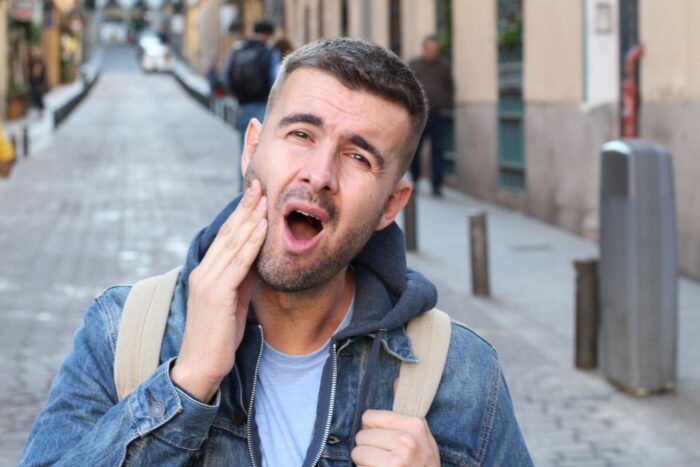When you open and close your mouth, you may notice a popping or clicking sound. You can find this sound in the jaw or temporomandibular joints (TMJ). Located on either side of your face, the TMJs connect your jawbone to your skull. It is the TMJ that is responsible for speaking and chewing. Essentially, it is what allows you to open and close your mouth.
You may not experience any pain along with the joint popping. However, you still should consider seeing a professional. Over time, you can develop pain or discomfort, along with other side effects. The popping and clicking are a result of a dysfunction in the TMJ. Dentists will refer to this dysfunction as a temporomandibular disorder (TMD), but most will be familiar with the term TMJ.
There is generally not much concern about TMJ as it is mostly harmless. However, it can develop into unfortunate side effects like the inability to open and close your mouth.


What Causes TMJ?
There is not an exact cause of TMJ. You may have been born with a mild defect in your jaw, or you may perform some activities that have caused it over time. Even your teeth can be a reason for popping and clicking in your jaw joint.
Behaviors
Any behavior that causes wear and tear on your joint can cause TMJ. In addition, your joints have a shelf life, so repetitive motions and activities can affect them.
If you grind your teeth or clench your jaw, you can eventually develop TMJ. Teeth grinding, also called bruxism, puts stress on your jaw and your teeth. Not only can you wear out your joints, but you can also wear down your teeth and enamel. Damage to the enamel can leave you vulnerable to developing cavities and tooth decay.
Biting your fingernails or the inside of your mouth can also cause TMJ. Both are repetitive movements, and you usually have to move your jaw out of a resting position to do either.
Conditions
Outside of repetitive behaviors, certain conditions can cause TMJ.
If you have sleep apnea, you are more likely to have TMJ. Obstructive sleep apnea is a sleep disorder where your airway is obstructed as you sleep. As a result, the muscles and soft tissues in your mouth and throat relax, which blocks your airway. Your mouth placement may have a part in sleep apnea. For example, if your jaw is out of place, it can cause your tongue and other muscles to obstruct your airway.
Arthritis is another condition that can cause your jaw to click and pop. Certain types of arthritis, such as rheumatoid arthritis or osteoarthritis, can limit the movement of your jaw. As arthritis progresses, it damages the cartilage in your joint. The damage to your joint restricts your ability to hinge your mouth. As a result, you will have a limited range of motion. Unfortunately, this can cause pain and discomfort.
